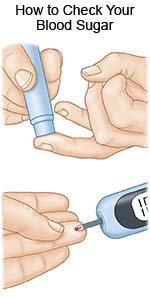Nondiabetic Hyperglycemia
Medically reviewed by Drugs.com. Last updated on Apr 6, 2025.
What is nondiabetic hyperglycemia?
Nondiabetic hyperglycemia means your blood glucose (sugar) level is high even though you do not have diabetes. Hyperglycemia may happen suddenly during a major illness or injury. Instead, hyperglycemia may happen over a longer period of time and be caused by a chronic disease.
Why is it important to manage hyperglycemia?
Hyperglycemia can increase your risk for infections, prevent healing, and it make it hard to manage your condition. It is important to treat hyperglycemia to prevent these problems. Hyperglycemia that is not treated can damage your nerves, blood vessels, tissues, and organs. Damage to arteries may increase your risk for heart attack and stroke. Nerve damage may also lead to other heart, stomach, and nerve problems.
What increases my risk for nondiabetic hyperglycemia?
- A medical condition such as Cushing syndrome or polycystic ovarian syndrome
- Surgery or trauma, such as a burn or injury
- Infections, such as pneumonia or a urinary tract infection
- Certain medicines, such as steroids or diuretics
- Nutrition given through a feeding tube or IV
- A family history of diabetes or gestational diabetes
- Obesity or a lack of physical activity
What are the signs and symptoms of hyperglycemia?
You may not have any signs or symptoms, or you may have any of the following:
- More thirst than usual
- Frequent urination
- Blurred vision
- Nausea and vomiting
- Abdominal pain
How is nondiabetic hyperglycemia diagnosed and treated?
Your healthcare provider will measure your blood sugar level with a blood test. You may be given insulin or other medicines to decrease your blood sugar level.
How can I help prevent hyperglycemia?
- Exercise can help lower your blood sugar when it is high. It also can keep your blood sugar levels steady over time. Exercise for at least 30 minutes, 5 days a week. Work with your healthcare provider to create an exercise plan. Children should get at least 60 minutes of physical activity each day.
- Maintain a healthy weight. Ask your healthcare provider how much you should weigh. A healthy weight can help you lower your blood sugar levels. Ask your provider to help you create a weight loss plan if you are overweight. Together you can set manageable weight loss goals.
- Follow your meal plan. A dietitian will help you make a meal plan to help lower your blood sugar level. You may need to decrease the amount of carbohydrates that you eat.
- Do not smoke. Nicotine and other chemicals in cigarettes and cigars can cause lung damage. They can also make your blood sugar levels harder to control. Ask your healthcare provider for information if you currently smoke and need help to quit. E-cigarettes or smokeless tobacco still contain nicotine. Talk to your healthcare provider before you use these products.
- Limit or do not drink alcohol. Alcohol can increase your blood sugar level. A drink of alcohol is 12 ounces of beer, 5 ounces of wine, or 1½ ounces of liquor. Ask your healthcare provider if it is safe for you to drink alcohol. Also ask how much is safe for you to drink each day.
Do I need to check my blood sugar level?
Your healthcare provider will tell you if you need to check your blood sugar level. He or she will also tell you how often to check it. Ask your healthcare provider what your blood sugar level should be. Write down your results, and show them to your healthcare provider. Your provider may use the results to make changes to your medicine, food, and exercise plan.
 |
Call 911 or have someone else call for any of the following:
- You have a seizure.
- You have trouble breathing or are short of breath.
- You become weak and confused.
When should I seek immediate care?
- Your blood sugar level is higher or lower than your healthcare provider said it should be.
- Your breath smells fruity.
- You have nausea and vomiting.
- You have symptoms of dehydration, such as dark yellow urine, dry mouth and lips, and dry skin.
When should I contact my healthcare provider?
- You continue to have higher blood sugar levels than your healthcare provider recommends.
- You have questions or concerns about your condition or care.
Care Agreement
You have the right to help plan your care. Learn about your health condition and how it may be treated. Discuss treatment options with your healthcare providers to decide what care you want to receive. You always have the right to refuse treatment. The above information is an educational aid only. It is not intended as medical advice for individual conditions or treatments. Talk to your doctor, nurse or pharmacist before following any medical regimen to see if it is safe and effective for you.© Copyright Merative 2025 Information is for End User's use only and may not be sold, redistributed or otherwise used for commercial purposes.
Learn more about Nondiabetic Hyperglycemia
Treatment options
Care guides
Further information
Always consult your healthcare provider to ensure the information displayed on this page applies to your personal circumstances.
